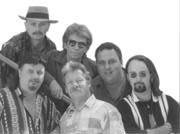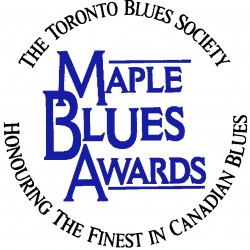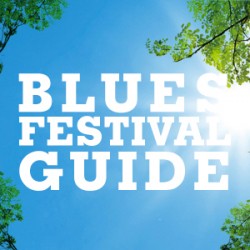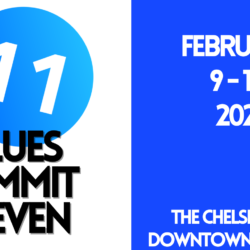13 true tall tales, and a brand-new Downchild album – Lucky 13
TBS Board member Richard Flohil, who once managed Downchild, when he and the band were much, much younger, has been their publicist off and on ever since. He was witness to some of the events discussed, and took some time out of his busy schedule to share those memories.
Donnie Walsh is talking from a phone booth at the dock where his boat, Elwood, is moored in Florida. Reluctantly, he is trying to recall 13 significant events in the past 28 years of the band’s existence, and the heat in the booth isn’t making it easy.
* The band’s first gig: “Honest, I don’t remember it. I guess the first real gig was at Grossman’s. I remember we played on Monday, then on Tuesday, then on Wednesday. Al Grossman gave us three jugs of draft for the band, and we each got a meal. I guess that was around June 1969. Later, we got the idea of passing the hat, but I think the waiters took more money out than people put in. We played there for six months, then we went to the Forbes Tavern at Shuter and Mutual; one day, the manager said ‘That’s it; no more bands.’ So we went back to Grossman’s. Stayed almost a year that time.”
* The band’s first record: “We did that at a studio called Sound Horn. It was on the second basement of the parking garage at Rochdale College. It said sound horn at the entrance to the place, because there was a blind corner. The control room was the size of a small walk-in kitchen, and there was a glass block wall dividing it from where the band was. You’d said you couldn’t manage us any more, and introduced us to David Bleakney and Jim McConnell. They put up the studio, I put up $500, and we made the record in mono on a two-track Revox with a Traynor mixing board. Then we got ambitious, and went back the next night with two Traynor mixing boards, and cut 14 or 15 tracks in stereo. But we couldn’t record overdubs. Hence, no harp.”
* Getting the record in the stores: “Bleakney and I got the record pressed up
-500 copies- put it in the trunk of the car, and took it to Sam’s on Yonge Street. I’d stopped by the day before, and Sam -himself- told me to bring it in and he’d sell it and put it in the front window. And he did. I love that guy! Then we started selling it at gigs, and RCA Victor (BMG now) heard about it, and they gave us $2,000 and they put it out on their label. They even got it released in Japan, but I don’t know whether any Japanese bought it.”
* The first out of town gig: “Well, it was in Winnipeg, in the middle of February. I’d never been that cold. We played at the Flame Burger, a joint on the Pembina Highway. RCA got us a radio gig, and the had station broadcast us live on Saturday night. I remember the Hock and I got up at some ungodly hour the next morning, because they were going to play the show again on the radio. They’d recorded it in stereo, but played it back in mono, so you could only hear half of what we we’d done. Disappointing, to say the least.”
* The band’s first concert: “I guess that would be Al Grossman Presents Downchild at the St. Lawrence Centre. Maybe 1971 or ’72. It was us, Bobo Jenkins out of Detroit, and Leon Redbone. Because it was a blues show, Leon played nothing but Hank Williams and a bunch of other country songs. He was pretty contrary back then; still is, I guess. Anyway, I think it was the first blues concert at that venue, and it sold out, and people were dancing in the aisles. I don’t think we got any money, but we got a lot of publicity.”
* The first bluesmen we met: “I suppose Cotton would have been the first. He came over the street from the Elmo to jam with us; we’ve seen him a lot in the years since. I remember Buddy Guy coming in; he’d been playing at the CNE in the Automotive Building. And Buddy Miles, on drums. Later, of course, we met Muddy, probably when he was playing at the Colonial. He was a very dignified, gentle man. Very congenial, subdued, and way older than us, of course. And, needless to say, a fabulous blues singer. We opened for him in Winnipeg later on. Of course, back then, we opened for all sorts – ZZ Top at the Gardens, B.B. King at Massey Hall and at the National Arts Centre in Ottawa, and Mike Bloomfield at Convocation Hall.”
* The best club dates: “Oh, the times at the Elmo. Back then, they’d book you for a week. We were the hot act – us and the Good Brothers. Man, the lineups were amazing outside. Later, we did a live album with a picture of me trying to get into the joint; it was called But I’m on the Guest List.”
* Playing in America: “One of the first times was a folk festival outside Philadelphia. We had an afternoon slot with a band from Scotland. They did real good; we went up, but we had some sound problems, and we turned round to fix them; when we were ready the audience had left. Our bass player got mad and kicked out the van window on the way back to the motel, then he kicked a door back in the room and broke his toe. But that night, we played for the performers’ party in the bar, and we just killed. Freddie Moore, who had played drums for King Oliver, sat in – the most economical player you can imagine – and everyone was dancing; we must’ve played for two hours straight.”
* Downchild on the radio: “Well, CBC is going to record the April 13 gig for Saturday Night Blues, and it’ll be done right – not like the time in Winnipeg. Or like the time we did a live show for CHOM-FM in Montreal, from André Perry‘s old studio in a church downtown. Half-way through the set, we got the word that the FLQ had occupied the studio back in Westmount, and we were told just to keep playing, while they negotiated with the guys who’d taken over the station. So we kept playing and playing, and finally the Hock said ‘screw it’ and we quit, but we’d been playing for more than two hours. Never did find out what happened on air after that.”
* The time the band quit on the 401: “That’s one of the legends. And the moral to the story is this: Never say to the band ‘Look, if you don’t want to do this gig in Ottawa you can get out of the van!’ They did. By the side of the 401 under a light drizzle in the early morning after we’d finished a late-night show in St. Catharines. I had to blow out the Ottawa gig and come back to Toronto, and hire everyone back again. Embarrassing. Not fun!”
* Most frustrating tour: “That’s easy. Three days on the road opening for Johnny Winter. We played the Gardens in Toronto, then drove in three cars up to Sudbury. After the Sudbury gig, our road manager took off back to Toronto – and took my car keys with him. The next morning, I couldn’t get into the car, so with one car gone to Toronto with the road manager, and half the band in the other, Jane (Vasey), Dave (Woodward) and I flew to Ottawa. As soon as that gig was over, Jane and Dave had to fly home, I had to fly to Sudbury, to try to find a locksmith on a Sunday morning… then it took him three hours to get the door open, and I had to drive back to Toronto on my own. That was not a profitable three days – a very expensive venture to say the least.”
* Oddest gig so far: “We were playing Bloomington, Indiana with Luther Allison. A nice club – maybe 200 people there. Did the first set, took a break, and I walked to the front of the club, opened the door – and I couldn’t believe it: there were 10,000 people in the street, yelling and screaming; there was a car on fire and another one was turned over; people were jumping on vehicles. I staggered back, went back on stage, played for another hour, and went out to have another look. The place was deserted, not a soul in sight. I found out later that the local team had just won the college basketball championships; they’d had their party, done their thing, and then all gone home.”
* Writing songs: “I guess Downchild is one of the few Canadian bands that does its own material on records, although we play several blues standards in the set. I’m one of those people that leaves the songs until the last minute – not always, but probably too often. So often, I’ll write ’em in the studio, teach ’em to the band, then record ’em. Now Chuck Jackson does it differently – generally he has his stuff ready to go. One of the songs that people like is “I Am Mr. Downchild”; I wrote that leaning on the speaker in the studio, and we just cut it right away. I don’t know where my songs come from – maybe they come from Mars. There’s one song on Lucky 13 that’s gonna be a Downchild standard, I think – it’s called “Last Chance to Dance”, and we got it from Pete Savory‘s band; we heard him playing it at the New Orleans Jazz Festival and it’s stuck with us since, but now we’ve recorded it. Still don’t know who wrote it, and nor does Pete.”
–Richard Flohil
13 bits of advice for musicians from Mr. Downchild himself
1. Always get a deposit before the gig; you’ll sleep better.
2. Never play for the door.
3. Don’t ever forget where the blues came from, or why.
4. Make a new record, however you can, every two to three years.
5. Write your own songs, but always play some of the classics in your set.
6. Never make eyes at people in audience before you find out whether she’s bubba, or he’s with Ilsa the she-wolf of the SS.
7. Never order room service-the extra cost is really a tax for being stupid.
8. The minute you can, hire a good road manager who knows how to get good sound.
9. Always drive the band vehicle yourself; this way no one else in the band can have an accident.
10. Never forget why you play the blues; if it was to make big money, you probably won’t.
11. Rehearsing? I wouldn’t know about that.
12. The geographical boundaries of the blues are limitless. Expand your horizons.
13. Like Sonny Boy said, never let the same person mistreat you twice.











